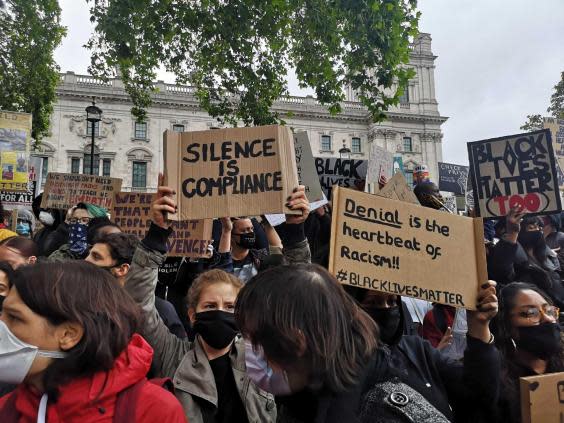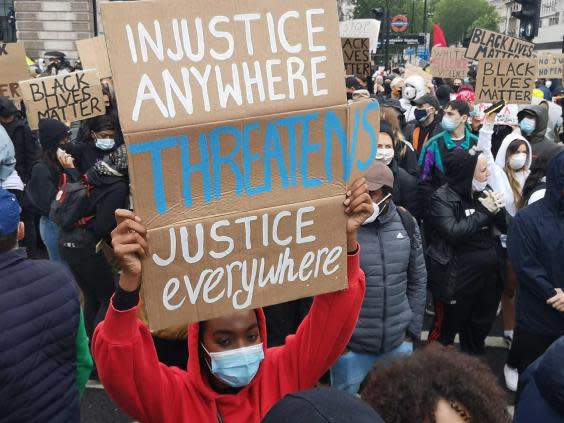‘No justice, no peace’: Tens of thousands protest against racism across UK despite coronavirus warnings

Thousands of people joined Black Lives Matter protests across the UK on Saturday calling for an end to systematic racism and police brutality – despite calls from the government to stay at home.
In London, those in attendance held up signs reading “racism is a pandemic”, “silence is violence”, and “the time to change was yesterday.”
Starting in Parliament Square, crowds marched through Victoria as well as towards the US embassy in Nine Elms.
The atmosphere early on was peaceful and welcoming, but the anger against the police and the government – both in the UK and the US – was clear.
“No justice, no peace, no racist police,” the crowd chanted. “Boris Johnson is a racist, Donald Trump is a racist.”
But as evening drew in, tensions began to mount. Some threw missiles at officers in protective gear, while mounted police drew back some demonstrators along Whitehall.
One officer appeared to be knocked off his horse, which then bolted – sending crowds of people scattering.
Despite a plea from the home secretary to stay indoors for fear of spreading coronavirus, thousands joined protests in London, and although many wore masks, there was little social distancing.
The average age of the crowd seemed young, although some families did attend with small children.
“I can’t breathe” – George Floyd’s final words – were the words etched on several facemasks.
Placards carried by demonstrators referenced the coronavirus crisis, with one that said: “There is a virus greater than Covid-19 and it’s called racism.”
#BlackLivesMatter protesters wear ‘I can’t breathe’ facemasks#GeorgeFloyd #LDNBLM pic.twitter.com/5lmVhmsskB
— Gemma Fox (@GemmaFox__)
Sparked by the killing of Floyd in Minneapolis, who died after police officers knelt on his neck for nine minutes on 25 May, the UK has witnessed mass demonstrations against racism and police brutality for the past two weeks. Protesters on Saturday demanded justice not only for Floyd’s death, but for the killing of Mark Duggan, Breonna Taylor, Sarah Reed and Belly Mujinga.
Standing on a ledge overlooking the square, 23-year-old Tamarra shouted “Black Lives Matter” through her megaphone, leading the crowd below her.

“When I was younger I was in social services and I did get in trouble with the police. I’ve been hurt by the police. I was pinned down and had a knee on my face when I was 14,” she told The Independent.
“As a child he probably didn’t hurt me as much as George Floyd had it. I feel I had some privilege being in this country because when I look back I think I could have lost my life if I was in America.”
“When it was happening it felt like I was not relevant, you’re not part of the world, you’re just a little piece of s***t on their shoe, like nobody cares, like you’re nothing.”
She said she hoped that the protests would force change within the system, so that black people like her could become less scared, and start to build up their faith in the police.
“We want the police to serve us and protect us, instead of murdering and stereotyping,” she added.

The UK police has faced numerous accusations of racism, with the 1999 MacPherson report published after the murder of Stephen Lawrence concluding those responsible were “institutionally racist”. Nearly a decade on, statistics show that black people in the UK are still twice as likely to die in police custody.
Many of those out demonstrating said they were regularly harassed by police, including 25-year-old Michael.
“I’ve been stopped and searched numerous times, it’s frustrating,” he said. “There’s so much that needs to be changed. A lot to do with education, our schools and how we raise our own kids.”
Another protester, who asked not to be named, said he had long lost track of how many times he had been stopped and searched.
“When I was younger, going to the shops for my mum, I’d come back in handcuffs, just because you’re young and black, so you look suspicious. You fit a stereotype,” he said.
As the protest tailed off towards Vauxhall, members of the public banged on pots and pans out of their windows, akin to the weekly clap for NHS staff. Cars stopped along the road and beeped in time with chants of “Black Lives Matter”.

At one point, about a dozen or so police walked alongside protesters chanting “no justice, no peace, no racist police”.
Thousands also attended protests in Manchester, Sheffield, Glasgow, Cardiff, Leicester – with Anthony Joshua attending in his home town of Watford.
Several hundred marchers gathered in Newcastle, while thousands more watched an online protest organised in the north east. A march is also planned for Sunday outside the US embassy.
For Sonia, from east London, the BLM movement is “fundamental” to creating a paradigm shift in the UK.
“Nothing has changed in hundreds of years, there’s constant oppression, systematic oppression, for too long people have felt comfortable to talk about something that is insidious and part of the fabric of our society today,” she said.
“It’s about love. We need to unite. It’s not about making people feel alienated, it’s about educating, and trying to minimise ignorance.
“We need to be shown that all lives matter, and that black lives matter.”
Read more
Thousands expected at huge George Floyd demonstration in Washington
Joshua on crutches as he marches in Black Lives Matter protest
Call Trump out over police brutality, Ed Davey tells Johnson
Buffalo mayor says elderly protester pushed to ground was ‘agitator’

